Is Salmon Skin Good for You?
Anyone who has tried it knows a well cooked, well seasoned crispy salmon skin is hard to resist, but — is salmon skin good for you? When sitting down to eat a delicious filet of salmon, the first question is whether to keep or throw the skin. Well you can enjoy that salmon skin with a clear mind and put that question to rest. In this article, you’ll see the benefits far outweigh the possible risks.
Salmon skin is nutrient dense in omega-3 and vitamins B and D, making it one of the healthiest foods that’s good for you. Many people worry that salmon skin isn’t healthy because of the fat content, or they think it contains toxins and heavy metals. You can put your mind at ease, because the kind of fat in salmon skin is the omega-3 healthy kind of fat, and we don’t get enough in our diets. The concern about toxins and heavy metals being more concentrated in salmon skin is mostly based on myths.
Nutrients Contained in Salmon Skin
Salmon skin is chocked full of nutrients and you’re doing your body a disservice if you’re letting all those nutrients go to waste.
Salmon Omega 3 Content
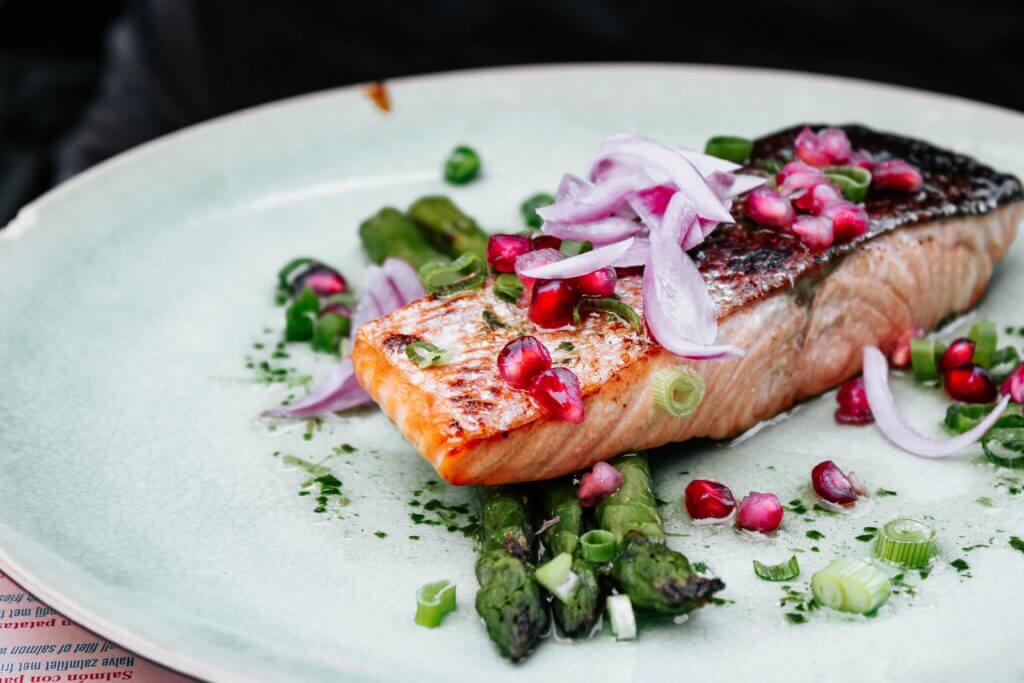
Let’s start with the big one — omega-3. The skin of salmon contains the largest concentration of Omega 3 and has been touted as the healthiest kind of fat you can eat. Omega-3 is sold alone as a supplement just for its nutritional properties. Omega-3 has been attributed to lowering blood pressure, reducing the risk of heart attack and stroke, as well as providing eye, brain and mood support just to name a few!
Vitamins in Salmon
Salmon skin also contains a generous amount of vitamins B and D, both of which are incredibly good for you and lacking in many modern diets.
Vitamin B directly affects your energy levels which is why it is often found in energy drinks. It also helps us to resist stress and fight chronic fatigue. Salmon skin is a natural source of this vitamin, which also supports eyesight, brain function and cardiovascular health.
Many people are lacking in vitamin D, which we only get from sunlight and a few food sources such as fish, liver, egg yolk and fortified beverages. This makes salmon even more important to have in one’s diet. A lack of vitamin d can result in mood disorders such as anxiety and depression, and is also responsible for building and maintaining bones and supporting the immune system.
Iodine in salmon
Salmon skin is also a good source of iodine which is also considered incredibly good for you. Getting enough iodine helps regulate your thyroid function, preventing hypothyroidism. It has also been proven to improve cognitive function in children.
Salmon Collagen
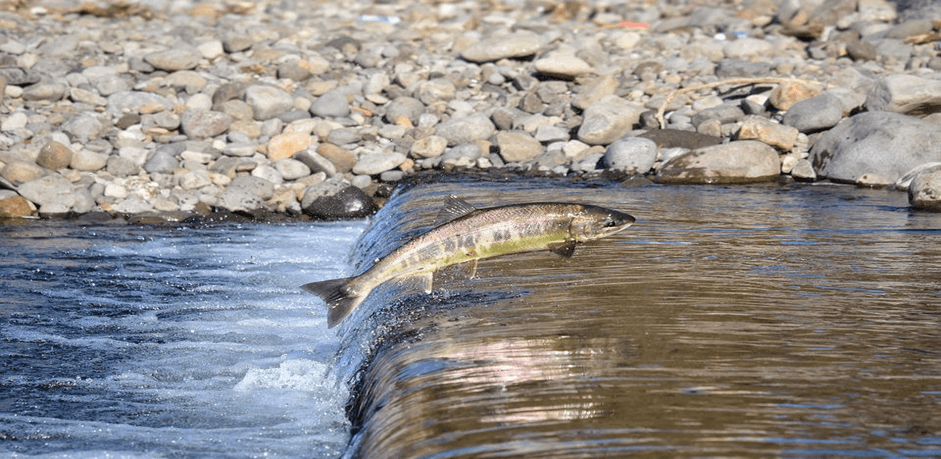
The last one you may not have thought about is collagen. Salmon skin contains a large amount of collagen, especially if it’s eaten with the scales. Collagen is one of the main components of skin and making collagen a part of your diet helps your skin stay supple and young looking. It also comprises the connective tissue and ligaments to keep your joints healthy and moving smoothly.
PCBs, Toxins and Heavy Metals
All fish contain a certain amount of heavy metals that they have accumulated from the environment. This amount is not higher in the skin than the rest of the fish. As well the only heavy metal that accumulates in any significant amount is mercury and we will look at mercury later in the article to see why that’s not a concern.
Although PCBs(polychlorinated biphenyls), a synthetic chemical, is now banned, it still rests in the environment and animals like fish absorb it. Are they a concern when eating salmon skin? Not exactly. The FDA has set a limit for fish of 2,000 ppb and salmon was found to have around 36 ppb. Also according to this 2020 study, the PCBs we absorb from food are comparable to the amount we absorb from breathing in the atmosphere.
While toxins such as pesticides are found in higher concentrations in the skin than the rest of the fish, according to a 2020 study, the amount found in fish was not found to be high enough to cause any detrimental effects in humans.
Why Mercury Is Not an Issue
Most people have heard about the dangers of mercury in fish. At high enough levels, mercury can cause mercury poisoning in humans which can cause rashes, itching, increased heart rate and neurology problems.
With salmon this is rarely a problem as salmon is a smaller fish, meaning it contains less mercury than a larger fish such as tuna. For example, salmon has only 0.022 ppm of mercury concentration on average and tuna has 0.144 ppm, according to the FDA. That means there’s over six times more mercury in tuna than in salmon!
Another point to consider is that the skin of salmon does not contain more mercury than the rest of the fish. So if you’re eating salmon in reasonable quantities (once a day is fine), you have nothing to worry about.
Salmon Scales are Edible
You might worry about the scales in salmon skin scratching your mouth or throat. Thankfully this isn’t a concern with salmon, because the scales are small, soft, and fully edible, unlike with larger fish that always need to be descaled before consumption. Salmon scales can also give a nice texture to the skin when properly cooked.
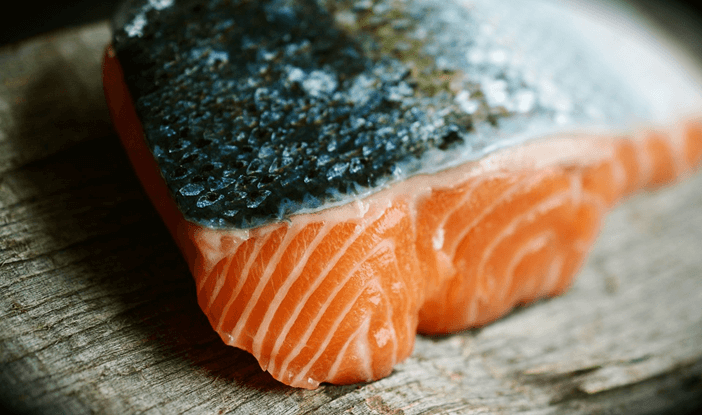
The Bottom Line on Salmon Skin
While there are many baseless claims floating around when it comes to why salmon skin might be dangerous for you. It is no more dangerous than the salmon flesh itself and actually contains many nutrients that can help you stay alive and healthy, longer. In fact, in Japan, salmon skin is sold by the bag as a snack like chips, and sold fried as a side dish. In Japan, it’s considered to be a healthy snack that’s good for you, it’s no wonder Japan has one of the highest life expectancies in the world.
So the next time you’re faced with the difficult decision of enjoying that crispy savory salmon skin or throwing it out -you’ll know that the answer to the question “is salmon skin good for you”, is that it’s not only good for you, but it also does a lot to support your brain, mood, bones and heart.
References:
Saktrakulkla, P., Lan, T., Hua, J., Marek, R., Thorne, P., & Hornbuckle, K. (2020). Polychlorinated Biphenyls in Food. Environmental Science &Amp; Technology, 54(18), 11443-11452. doi: 10.1021/acs.est.0c03632
Food Safety: What Foods Are Safe to Eat?. (2022). Retrieved 11 May 2022, from https://www.onhealth.com/content/1/food_safety_salmon_and_beef_whats_safe_to_eat
(COVID-19), C., Health, E., Disease, H., Disease, L., Management, P., & Conditions, S. et al. (2022). Health Benefits of Iodine. Retrieved 11 May 2022, from https://www.webmd.com/diet/health-benefits-iodine#1
2022. [online] Available at: <https://www.intrafish.com/feed/researchers-find-cocktail-of-pesticides-in-salmon-feed-but-say-levels-pose-no-risk-to-human-health/2-1-896099> [Accessed 11 May 2022].
When You Eat Salmon Every Day, This Is What Happens To Your Body – The List. (2019). Retrieved 11 May 2022, from https://www.thelist.com/181211/when-you-eat-salmon-every-day-this-is-what-happens-to-your-body/
Technical Information on Development of FDA/EPA Advice on Eating Fish. (2022). Retrieved 11 May 2022, from https://www.fda.gov/food/metals-and-your-food/technical-information-development-fdaepa-advice-about-eating-fish-those-who-might-become-or-are

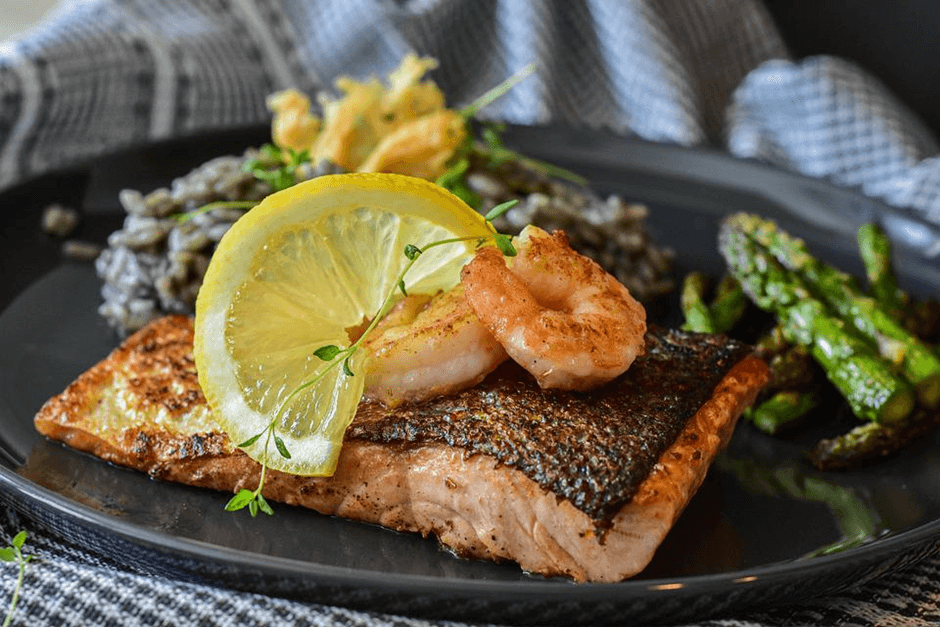


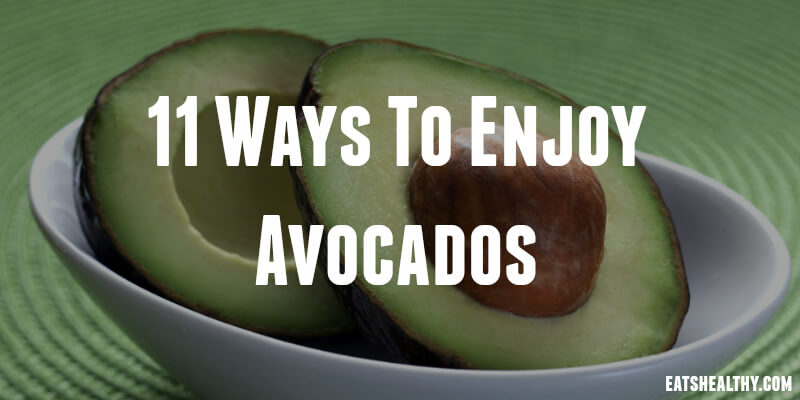


Pingback: Can You Eat Salmon Everyday? - EatsHealthy.com
Pingback: Can You Eat Salmon Every Day? - EatsHealthy.com